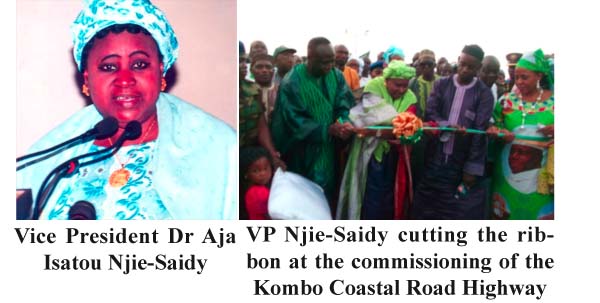
The contractor of the project was Compagnie Sahelienne Entreprise (CSE), supervised by the United Engineering and Technical Consultants Limited (UNETEC).
The project was a loan funded by the Arab Bank for Economic Development in Africa (BADEA), with the Gambia government contributing 10 per cent of the total cost.
Addressing the gathering, VP Njie-Saidy spoke of the remarkable strides made by the government in improving the living standards of the people, in terms of road infrastructure among other development aspects, with the Kombo Coastal Roads serving as an example of the development initiatives in the sector since 1994.
According to her, the contract for the construction of almost 80 kilometers of roads within the area was signed in May 1998 at a contracted sum of about GMD113 million.
The successful completion of the roads addressed the challenges within the Kombos, which were either non-surfaced gravel roads or bush tracks, making commuting difficult for the people living in the area.
The successful completion of the roads marked the achievement in The Gambia’s efforts of meeting its Vision 2020 goal, she said.
VP Njie-Saidy signified government’s efforts demonstrated in providing both national and regional connectivity.
She said the country’s coastal area has the highest concentration of tourists, hotels, the fishing industry and housing projects, which are springing up, as well as roads accessible by land, “making life easier for the people of the area”.
She thanked the funding agencies, the Works ministry and all who made the project a reality.
Transport, Works and Infrastructure Minister Balla Garba Jahumpa highlighted some of the achievements registered under the 22nd July Revolution, with the successful completion of the Kololi-Bijilo-Sukuta and Airport Junction road, Sukuta to Kartong village, as well as Gunjur to Brikama among others.
Cabinet ministers among other dignitaries witnessed the event.



